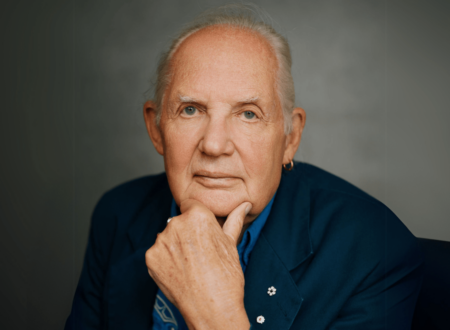 Archbishop Desmond Tutu makes a long journey this week, from his home in South Africa to northern Alberta. Why would this Nobel peace prizer winner — whose moral authority and wise words helped to move the mountain of apartheid in South Africa — come to northern Alberta? He is coming to help connect the dots between indigenous rights, care for the earth, and climate change. He is coming to help us think about (and challenge ourselves about) the reconciliation journey that Canada is on, in its relationship with Aboriginal people and with the earth.
Archbishop Desmond Tutu makes a long journey this week, from his home in South Africa to northern Alberta. Why would this Nobel peace prizer winner — whose moral authority and wise words helped to move the mountain of apartheid in South Africa — come to northern Alberta? He is coming to help connect the dots between indigenous rights, care for the earth, and climate change. He is coming to help us think about (and challenge ourselves about) the reconciliation journey that Canada is on, in its relationship with Aboriginal people and with the earth.
OKT and the Athabasca Chipewyan First Nation approached Tutu, and asked him to speak at the May 31st and June 1st As Long as the Rivers Flow conference on Treaty Rights. To our delight, he agreed. And now, Tutu’s visit is stirring public interest and debate. As we wrote in a piece in the Globe and Mail this week (found here), no one but the Archbishop knows exactly what he will say – he is a free and eloquent spirit. But we do know that we are thankful he is joining us for this important national conversation on how we balance economic development, Aboriginal rights and care for the earth.
Tutu will join a group of amazing speakers (such as Winona LaDuke, Stefen Kakfwi, Ovide Mercredi and Miles Richardson) to look at how economic development in the oil sands region can be transformed to respect treaty rights, protect the environment and ensure that benefits are equitably shared.
Aboriginal peoples entered treaties in northern Alberta (and elsewhere in Canada) with the understanding that they were agreeing to share the land with incoming settler and under the condition that Aboriginal groups would still have the right to live as they always lived, getting sustenance from the land that those communities have lived on for thousands of years. But this fundamental treaty principle is now undermined in ways that are dangerous for the long term health of both Aboriginal and non-Aboriginal communities and our relationship with one another.
It is now nearly fifty years since Canada first wrestled with major pipeline developments in the north (leading to the Berger Inquiry and a moratorium on pipeline development until Aboriginal land claims were addressed). In these decades, Canada has been on a long reconciliation journey with Aboriginal people. A key part of that journey is the settlement of large modern land claims agreements in the north. Those agreements provide robust recognition of Aboriginal land and other rights, and set up comprehensive systems for social, political and other structures. They guarantee Aboriginal participation in economic development. First Nations in these land claims settlement areas exercise their own jurisdiction and meaningfully participate in decisions about projects that will affect their lands, their culture and the environment.
But Canada is staggering and falling down, on the reconciliation journey, when it comes to addressing those same rights and needs of First Nations in the historic treaty areas (like Treaty 8 in northern Alberta). With the vigorous push for resource development in many treaty areas, particularly in the northern parts of many provinces, comes the renewed need to negotiate agreements based on a contemporary understanding of the treaty relationship. It is clear that the journey we are currently on has hit significant stumbling blocks – projects are delayed, tensions rise, and conflicts abound because there is not yet a good process in place for reconciling Aboriginal and treaty rights with big resource development project proposals.
At OKT, we believe that all Canadians are treaty partners. This conference is about bringing people together to explore the honourable next steps are all the partners in Treaty 8 (and other historic treaty areas). We think that honouring the treaties in a robust way is the economically and environmentally smart thing to do.
We are glad that Archbishop Tutu will join us as we discuss the pressing need for reconciliation between First Nations and other Canadians. We expect that he will address the moral imperative on our generation to reconcile our use of fossil fuels with the evidence that it is contributing to catastrophic climate changes that will affect future generations. (See his recent opinion piece in the Ottawa Citizen here). We know that this is a key part of the Treaty renewal discussion, and a critical part of the reconciliation journey between Crown and First Nations governments.
It’s time for us to use the amazing energy and imagination that we know Aboriginal and non-Aboriginal peoples and governments can mobilize, to inform the relationships that have been so badly hurt by the Indian Act and to address the need for Treaty renewal. We are glad that Archbishop Tutu is joining us on this important reconciliation journey.
________________________________
There will be a live webcast of Tutu’s speech (and the entire conference). You can register to participate in the webcast by going to the registration portion of conference website, here.
By Bob Rae and John Olthuis
Related Posts

First Nations Fight Canada in Court this Week Over Right to Safe Drinking Water
MONDAY, OCTOBER 7 – OTTAWA – Today Shamattawa First Nation and Chief Jordna Hill are in court against the Government of Canada over the right to safe drinking water…
Read More...
OKT Podcast - United Nations Declaration on the Rights of Indigenous Peoples (UNDRIP)
Tuesday, May 7, 2024
Is UNDRIP going to bring about transformational change to the relationship between Canada and Indigenous peoples? What about the federal government’s implementing legislation?
In this episode,…
Read More...
Court of Appeal for the Northwest Territories Confirms Sahtú Communities Can Manage the Harvesting of Wildlife in Their Territory
Monday, January 20, 2025
The Court of Appeal for the Northwest Territories (the “Court of Appeal”) recently released a decision that confirms that communities in the Sahtú…
Read More...

